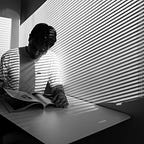The extraordinary power of banal evil
After dinner with my friends, I talked about this drama incidentally. I said that this company turned the heroes into an entertainment star-like group for profit, and at the same time wanted to penetrate into the U.S. defence system and become part of the national armed forces. This perspective of interpretation is very fresh.
My friend sneered, saying that if the core goal of the villain’s company is to be a government supplier, then this goal is too weak. If the conspiracy of a person with superpowers is the same as that of a person without superpowers, it would be boring. Supernatural abilities mean superpower. Even if you want to “rule the world” as a cliché, after all, no one has really ruled the world. Therefore, the pursuit of ruling the world is the greatest power that has never appeared in human history.
In most novels, superpower villains involving conspiracy plan, the author will inevitably try hard to give them personal ethical values. “I am eager to rule the world”, “I want to kill half of the people and save the other half”, “I want to eliminate certain natural attributes of mankind (such as war), even if it will turn mankind into waste”. Whether the plan is ingenious is what judges the quality of the novel.
After thinking about it, I think the mediocre goal of the company Vought in this play is precisely the essence of the film.
Because Vought is not a supervillain. It is the embodiment of capital. After erasing personal desires, personality and temperament, it will only show the inevitable appearance of capital, an inhuman monster: chasing profit, making peace with power, and then chasing more profit.
Vought does not want to draw an unprecedented and ingenious plan just because it owns countless superheroes. This is meaningless. For the company, a superhero is just a cool commodity, and the meaning of a commodity is to make more money.
This is why Vought and its conspiracies (extorting politicians, creating super terrorists) seem so vulgar. Vulgarity is ordinary, that is, the world should be so. Who can fight things that are taken for granted?
As a result, superheroes, the gods of the world who represent justice, miracles, and hope in mainstream discourse, eventually had to (mostly willingly) succumb to the power of capital and be packaged, trampled, and sold like a prostitute.
Just as each product itself is a fictional story, “superheroes” are also fictional. Comics, movies, news, documentaries, and advertisements have created the stories of these “gods” in all directions. But after all, they are false idols, and the superheroes under the shell are just human beings, and their privates are all filthy. Among them, those with absolute power have not become gods but have become absolutely corrupt demons.
If the “superhero” in the narrow sense does not exist, then their natural opposite, the “super villain” is equally impossible to exist. So under Vought’s plan, it became another fictional business story. They use the existence of super villains to highlight the need for superheroes to intervene in national violent institutions. It’s extremely ironic.
We have imagined ten thousand kinds of evil in the story, but never one has appeared in this play. It is not concretely human, machine, or monster. It is just ordinary capital that can be seen everywhere, and we live in it all day long. However, this mediocre evil is far powerful than all the extraordinary superpowers in the world, and it easily accomplishes the great achievement that the super villains have never accomplished - crushing superheroes into powder - if there is a “superhero” in the narrow sense.
